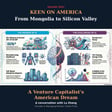
The charming gay racist who invented modern American conservatism: Sam Tanenhaus on William F. Buckley's absurdly implausible contradictions
The troubling thing about William F. Buckley, the media savvy founder of modern American conservatism, isn’t so much his politics, but his likability. How could such an overtly reactionary racist and homophobe (even if he was himself gay), be such a charming fellow beloved by all who knew him? That’s one of the central questions which Sam Tanenhaus addresses in his massive new biography Buckley. Tanenhaus reveals shocking new details about the Buckley family's secret funding of segregationist newspapers and White Citizens Councils—information that even appalled Buckley's own son Christopher. Buckley explores how someone could be genuinely charitable and philanthropic in his personal affairs while promoting such corrosive politics. Tanenhaus argues we live in a moment when it seems "almost impossible to disentangle those personas," yet Buckley embodied both simultaneously. This wasn't just genteel bigotry—it was a foundational contradiction that changed the United States and now helps define the theatrical toxicity of Trump’s America.
1. Buckley's Family Secretly Funded Segregationists
"Buckley's family actually sponsored the publication of a newspaper that supported the White Citizens Council... Buckley had kept it secret. He never told anyone."
Tanenhaus reveals that the Buckley family funded segregationist publications in the South—a bombshell that "appalled" even Buckley's own son Christopher.
2. The Paradox of Personal Charm vs. Political Toxicity
"Gary Wills... said Buckley was simply the most charitable man you would meet that he had ever known. And he said, I love everything about Bill Buckley, but his crazy reactionary politics."
The central mystery: How could someone be genuinely kind in person while promoting destructive ideologies? Tanenhaus argues this contradiction is what made Buckley so complex and influential.
3. Questions About Buckley's Sexuality Haunted His Public Life
"Vidal called Buckley a crypto-Nazi and Buckley said, don't call me a Nazi, you queer or I'll sock you in the goddamn face."
The famous 1968 debate with Gore Vidal exposed underlying tensions about Buckley's identity, with suggestions he was a "closeted gay man" himself while using homophobic language.
4. Buckley Invented Modern Political Theater
"Buckley's innovation... was to see that media itself could become the instrument for a kind of theatrical presentation of history. And that proved to be really precious. And that's what we're living with now is politics is a kind of theater and even entertainment."
Through "Firing Line" and his seemingly ubiquitous media presence, Buckley pioneered the performative politics we see today.
5. His American Dream Was Reactionary Restoration
"It was a dream of restoration... what he wanted to do was to create an America his own parents would have been comfortable in."
Buckley sought to return to the "late 19th and early 20th centuries of entrepreneurialism, of laissez-faire economics"—a world Tanenhaus calls "a powerful delusion."
This is a public episode. If you'd like to discuss this with other subscribers or get access to bonus episodes, visit keenon.substack.com/subscribe











